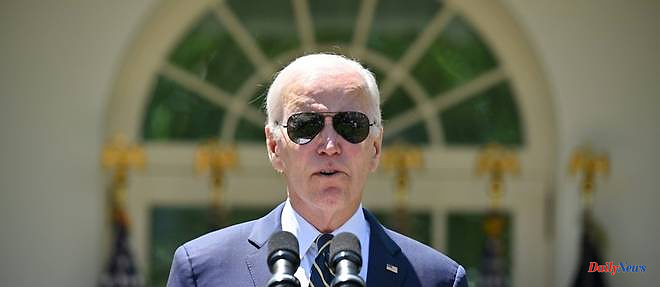Joe Biden, who prides himself on being a master in the art of political compromise, is playing big in the difficult budget negotiations to avoid a default in payment by the United States.
As the beginning of June approaches, synonymous with the potential bankruptcy of the American state, some elected Democrats - anonymous - are wondering: where is the American president?
Candidate for re-election, the Democrat must find a budgetary compromise with the Republican opposition, so that the conservatives agree to vote, in Congress, for an increase in the American public debt ceiling.
"The White House's communication strategy is atrocious," complained, for example, a Democratic parliamentarian to CNN.
The Republican Speaker of the House of Representatives, Kevin McCarthy, to whom this crisis offers his greatest media exposure to date, is happy to occupy the field, multiplying the exchanges with the press.
For quite a while, the American president was, in fact, absent: he went to Japan for several days for a G7 summit.
But before that, he had twice called together parliamentary leaders in the Oval Office.
And he cut short his trip, which was then to take him to Oceania, to return to the White House. Shortly after his return, he received Kevin McCarthy there, this time one-on-one.
For the rest, he wants to leave "space" to his team of negotiators, said his spokeswoman Karine Jean-Pierre. A team which, notable fact in an execrable political climate in Washington, receives only praise from the Republicans.
Has Joe Biden lost that flair he boasts of acquiring over decades of political life, failing to understand a turbulent political landscape?
Or is his reserve, on the contrary, a tactic not to expose himself too much before the conclusion of a compromise which, inevitably, will disappoint among the Democrats and the Republicans?
“We have to find something that we can sell to both sides,” he warned when he received Kevin McCarthy, laboriously elected to the House of Representatives, in the Oval Office due to the reluctance of the most right-wing Trumpists.
The 80-year-old Democrat is probably under no illusions: in this political-fiscal crisis difficult to understand outside the Washington bubble, there is, for each side, not much to gain and much to lose.
If a compromise is reached, it means the Republicans will have compromised on their demands for fiscal restraint and the White House will have capitulated on some spending - either way, the mere fact of negotiating is already a setback for the president, who refused to departure from being taken "hostage."
But Joe Biden knows he has a lot more to lose in the event of default, he who is already struggling with a reduced popularity rating, and with recurring questions about his age and his vitality.
"There are Trumpists in the House of Representatives who know the damage (a default) would do to the economy. And because I'm the president, and because presidents are responsible for everything, it's Biden who would be held accountable. And that's a good way to make sure Biden doesn't get re-elected," he said at a recent press conference.
26/05/2023 22:39:43 - Washington (AFP) - © 2023 AFP












